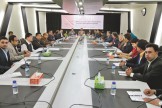The government should proactively disclose information instead of creating barriers to bring down corruption, analysts said yesterday.
“On the one hand, we have passed the Right to Information Act and are calling for good governance. On the other, we are not disclosing information proactively. Things should not be like this,” Information Commissioner Sadeka Halim said.
She particularly called out the land ministry for its reluctance to disclose information, although land is the root of most legal disputes and killings.
Her comments came at a round-table on Access to Information Central to the Post 2015 Development Agenda, organised by Article 19, a non-governmental organisation, The Daily Star and Equity and Justice Working Group-Bangladesh (EquityBD) at The Daily Star Centre.
The information commissioner also criticised the civil society organisations for their apathy in reviewing whether and to which extent the citizens have benefited from the Right to Information Act, adding that the commission is not as independent as seen from outside.
The ICT act, the Right to Information Act and the draft National Broadcasting Policy are contradictory, she said. “If this is the case, we will not go very far.”
Tofail Ahmed, an expert on local government, said the ministries, for instance, do not reply to emails although the use of IT has widened at government agencies. “They only respond to letters — why is it so?”
He said the information provided by the candidates to the Election Commission ahead of elections would not give any dividend if the voters are not aware of them.
“But this is not being done. The information about the candidates was published on the commission website before the 10th parliamentary election, which was later withdrawn.”
“The same might be true in case of upcoming upazila elections. We may not get information on time. If we cannot ensure this, we will not be able to show the results, even if we have the Right to Information Act and the Information Commission.”
Ahmed, also a former professor of Chittagong University, said the legislations should be reviewed if there are any problems with them. “We also need to look at compliance as it is not being maintained.”
Shamsul Alam, a member of the planning commission, said the Right to Information Act could help curb corruption if it can be used in the right manner.
Iftekharuzzaman, executive director of the Transparency International Bangladesh, backed him, adding Bangladesh could have done better with the millennium development goals were there no challenges by way of governance and corruption.
At least 13.6 percent of the national budget has been lost to corruption in the key sectors of MDGs in fiscal 2011-12, Iftekharuzzaman said.
Access to information is fundamental to fighting corruption, particularly in empowering people to raise questions.
“It will be important when we talk about the sustainable development goals [SDGs], so that we don’t make the same mistakes.”
The anti-graft campaigner said key development goals in areas of education and health have been exposed to serious risks and hostage to politics.
“We will have to address these issues. Otherwise, we will lag behind when it comes to SDGs.”
Nazrul Islam, additional secretary of the cabinet division, admitted that the ministries cannot answer emails due to lack of preparedness. “It is a shameful reality.”
He said the government plans to use 4,500 union information and services centres to boost people’s access to information and launch a website of 25,000 website links later this month, with a mandatory provision for keeping those websites updated.
Akram H Chowdhury, a former lawmaker, identified the lack of readiness in providing information as a missing link.
Shaheen Anam, executive director of Manusher Jonno Foundation, who successfully campaigned for the enactment of the Right to Information Act, said the MDGs have left out critical aspects of human rights and governance, which created a huge pocket of marginalised and poor people.
“As the high level committee of the UN has recognised those issues this time, it will be our role to help integrate those issues in the SDGs.”
She said people would have to be made the central figure of the SDGs. “People having access to all kinds of information is a prerequisite for that.”
“It is also about holding the government accountable. It happens when people have proper access to information at the right time.”
Political will, complete independence of the regulatory bodies such as the Information Commission, the Anti-Corruption Commission and the Election Commission, and democracy within the democratic institutions are very important, the MJF executive director added.
Tanjib-ul Alam, a lawyer of the Supreme Court who helped draft the Right to Information Act on behalf of civil society, said the answer to the deep-rooted corruption lies with the enforcement of laws.
Salehuddin Ahmed, managing editor of The Daily Star, who moderated the discussion, said the MDGs have been set for only developing countries while the SDGs would be for all countries.
“So, when something is for all countries then there is risk that the developing countries might be marginalised. We have to keep our interest at the forefront.”
He said ensuring the right to information is a precondition to people’s participation. The government values the access to information issue although it is not highlighted predominantly in the UN discussions, said Saida Muna Tasneem, director general of the UN and Human Rights desk at the foreign affairs ministry.
The youth would have to be engaged with the issue of access to information to take the movement forward, said Monisha Biswas, policy advocacy manager of Oxfam.
Awareness about the benefit of the Right to Information act has to be raised to get people interested, said Mohammad Kamruzzaman of Bangladesh NGOs Network for Radio and Communications.
The government also needs to make public the bilateral and international treaties, said Asgar Ali Sabri, a director at ActionAid Bangladesh.
“The people don’t know about some of the treaties and agreements the government has recently signed.”
MS Siddiqui, an author, alleged that the government uses trickery to camouflage corruption and inefficiency in the development spending and the system loss of the service providers.
The National Broadcasting Policy would take Bangladesh backward, undermining the achievements it made through the Right to Information act, said Faruque Ahmed, executive editor of the New Nation.
Rezaul Karim Chowdhury, chief moderator of EquityBD, and Tahmina Rahman, director of Article 19 for Bangladesh and South Asia, also spoke.
Source: The Daily Star










